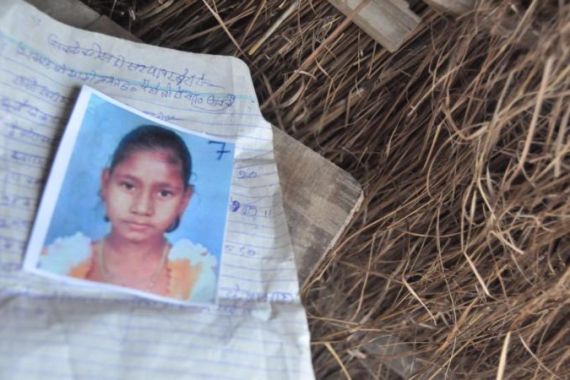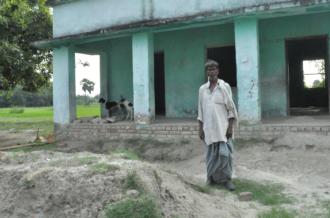Anger lingers after India school poisoning
More than a month after 23 children died from tainted food, local residents are still wary of midday meal scheme.

Bihar, India– Mukeshwar Ram carried his eldest grandson’s body over his shoulders on the afternoon of July 17 to a field outside a school in Gandaman village and started digging while around 200 villagers watched.
The earth was turned over and emptied onto the grave of the eight-year-old child, whom he looked after while his son, the child’s father, worked outside the state.
This was Ram’s way of protesting against the Dharamasati Gandaman primary school midday meal tragedy that claimed 23 lives in the Saran district village in the Indian state of Bihar a day before.
The free lunch programme, known as the Mid Day Meal, is an ambitious and universal scheme launched by the Indian government as an incentive for children from poor and rural backgrounds to attend public schools.
Ram, whose grandson Rahul was one of the victims, said the children would have been alive if it were not for the apathy of the government.
“Nobody came,” he said. “Nitish Kumar [the Chief Minister of Bihar State] should have come. But we are poor. Why should he care? They have said they would build a memorial. I will build a memorial myself. They gave us the money for our dead but he should have come to see how we are getting by.”
The chief minister of Bihar, has yet to visit the village, which has a population of around 2,000 people.
After the incident, he announced a plan to develop Gandaman into a model village with a high school, a healthcare centre, proper roads, drainage and water facilities.
Too little, too late?
The deaths, according to a Ministry of Human Resource Development report, occurred due to toxic levels of monocrotophos agricultural pesticide, an organophosphate insecticide.
The report said that if village residents had easier access to medical attention some of the deaths could have been averted.
A solution as simple as providing the children with salt water to induce vomiting would also have helped save lives, according to the report.
I don't want to send Putul to school ever. One daughter I sent, and she died.
Following the tragedy, the school’s headmistress, Meena Devi, fled the school.
Local residents said that Manju Devi, the school’s cook, had complained about a foul smell emanating from the potato curry but the headmistress insisted the children eat the food anyway.
Meena Devi, with “Devi” being a title bestowed upon women by the villagers, was eventually arrested on various charges, including attempted murder and criminal negligence.
Schools in neighbouring villages like Azad Bigha in the Jehanabad district and Baluan have stopped serving the midday meal, with many students refusing to eat upon the insistence of their parents.
But parents of the victims said the killings are part of a broader trend of official neglect.
Vinod Mahto is tired of the promises. He lost three children – two daughters Arti, 9, and Shanti, 7, and a son Vikas, who was five years old.
He is a migrant worker in Ludhiana, a city in the Indian state of Punjab, where most men from Gandaman work.
He wasn’t home when the incident occurred. His wife barely talks.
“I don’t have anything to say. I lost too much,” Mahto told Al Jazeera.
Lack of trust
Most of the children were dalits, part of India’s lowest caste also know as untouchables, and belonged to very poor households. Education was their only hope.
Ram said he used to send Rahul tuition money for English language and Mathematics classes and felt very proud when his grandson spoke in English.
“It is difficult,” he said. “He was my first grandchild. I told him stories and he would sleep next to me. I am angry. I want the principal to be hanged. Why did she force the children to eat the food that day?”
Malti Kuwar, another parent of a victim, said she cannot think straight. Her daughter Kajal, a student in the third grade, had forced her to send her to school.
She was the first among Kuwar’s six children to attend school. Kuwar is a landless agricultural labourer, who lost her husband nine years ago, and works odd jobs making Rs 25 or about $0.39 a day.
 |
| Mukeshwar buried his eight-year-old grandson outside the school where the poisonous meal was served. [Chinki Sinha/ Al Jazeera] |
Her three sons and her eldest daughter Rekha, who is married to a migrant worker from a nearby village, work and live in Ludhiana.
Putul, her 12-year-old daughter, corrected Kuwar when she said she has six children.
“Oh, yes. Kajal is dead,” she said, and broke down.
“I don’t want to send Putul to school ever. One daughter I sent, and she died.”
The government has announced $3000 as ex-gratia payment to the families that lost their children. But money will not fill the gap, Kuwar said, who was not home when her daughter collapsed.
“She used to study all the time,” she said. “But this is the cost of education. I don’t trust the government any more.”
Ram Vilas Paswan, a political leader in Bihar, announced he would donate $22,800 towards constructing a memorial for the children. But Ram wants to build a park and dedicate it to the deceased children.
“Now, we don’t know if we should send our children to school,” he said.
The government has said they would build a high school, and a healthcare centre in the village.
But in a region with the absence of even bare minimum services, it is yet another promise that the people do not believe.
Follow Chinki Sinha on Twitter.